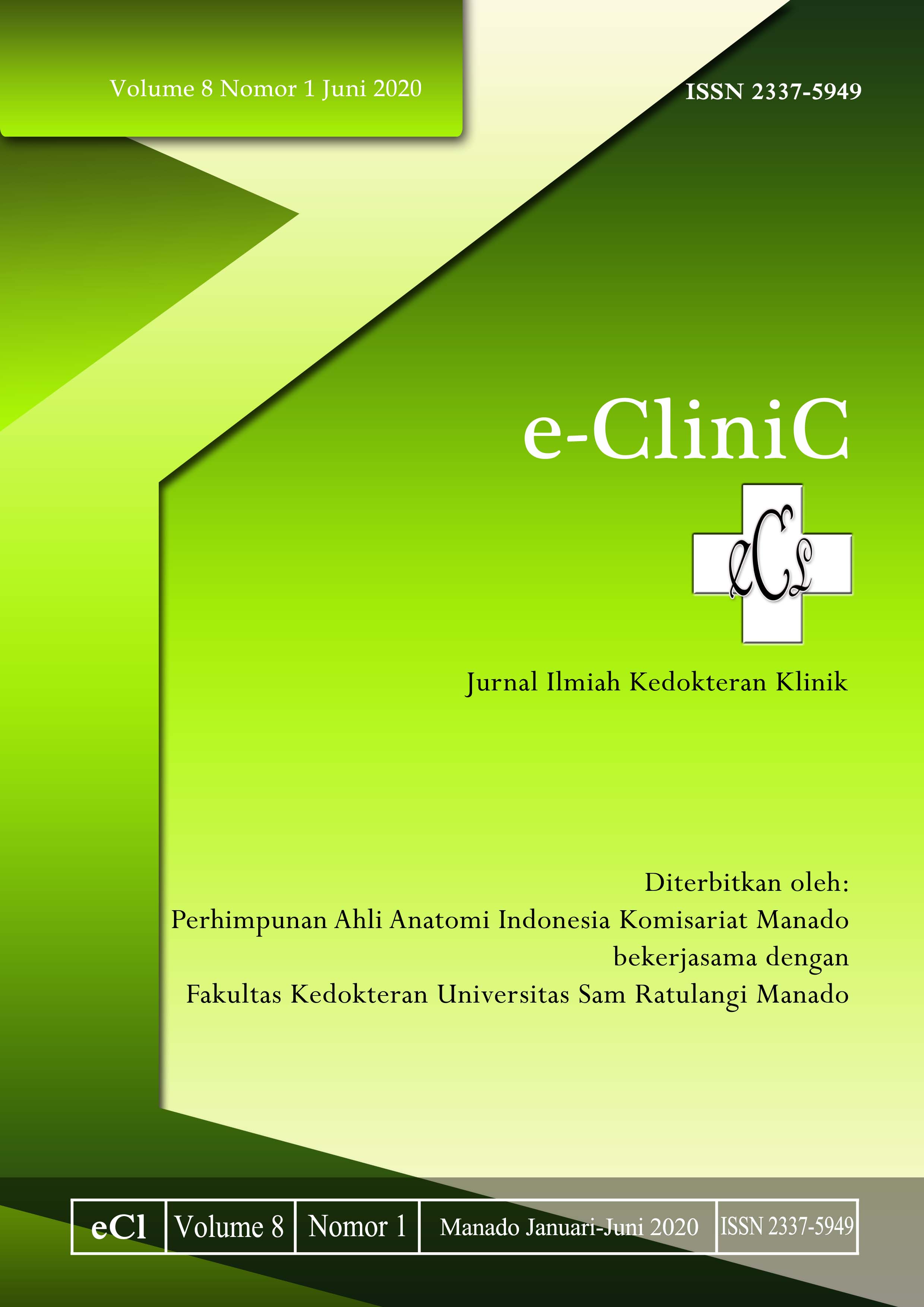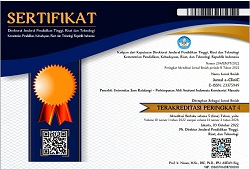Hubungan antara Mencuci Wajah dengan Kejadian Akne Vulgaris pada Remaja Laki-laki di Manado
DOI:
https://doi.org/10.35790/ecl.v8i1.28310Abstract
Abstract: Acne vulgaris is a chronic skin condition involving inflammation of the pilosebaceous follicle. The highest prevalence of acne vulgaris is at the age of 16-17 years. Pathogenic factors contributing to the development of acne vulgaris include increased sebum production, pilosebaceous follicular blockage, and increased colonization of Propionibacterium acnes. Personal hygiene is suggested as an important factor that needs to be maintained in acne prevention. Males tend to lack of awareness to seek information and health services in dealing with acne problems. This study was aimed to evaluate the relationship between facial washing and the incidence of acne vulgaris in adolescent males in Manado. This was an analytical and observational study using a cross-sectional design. Subjects were male students of 3rd grade at SMA Negeri 9 Manado, aged 16-19 years old, and met the inclusion and exclusion criteria, with a total number of 95 students. Subjects who washed their faces 2-3 times a day were 38 students (40%) while those who washed their faces less than twice or more than thrice a day were 57 students (60%). Subjects with no or mild acne vulgaris were 39 students (41.1%), while those with moderate to severe acne vulgaris were 56 students (58.9%). The chi-square showed a p-value of 0.004 for the relationship between the frequency of facial washing and the incidence of acne vulgaris. In conclusion, there was a significant relationship between facial washing and the incidence of acne vulgaris in adolescent males in Manado.
Keywords: facial washing, acne vulgaris
Â
Abstrak: Akne vulgaris merupakan peradangan kronis folikel pilosebasea dengan prevalensi tertinggi pada usia 16-17 tahun. Faktor yang memengaruhi terjadinya akne vulgaris antara lain peningkatan produksi sebum, penyumbatan folikel pilosebasea, dan peningkatan kolonisasi bakteri Propionibacterium acnes. Kebersihan diri merupakan faktor penting yang perlu dijaga sebagai salah satu usaha untuk mencegah timbulnya akne. Laki-laki cenderung kurang memiliki kesadaran untuk mencari informasi dan pelayanan kesehatan dalam menangani masalah akne. Penelitian ini bertujuan untuk menilai hubungan antara mencuci wajah dengan kejadian akne vulgaris pada remaja laki-laki di Manado. Jenis penelitian ialah observasional analitik dengan desain potong lintang. Subjek penelitian ialah siswa laki-laki kelas 3 di SMA Negeri 9 Manado, usia 16-19 tahun, dan memenuhi kriteria inklusi dan eksklusi, dengan jumlah total 95 siswa. Subjek yang mencuci wajah 2-3 kali sehari sebanyak 38 siswa (40%) sedangkan yang mencuci wajah kurang dari 2 kali atau lebih dari 3 kali sehari sebanyak 57 siswa (60%). Subjek tanpa akne vulgaris atau akne derajat ringan sebanyak 39 siswa (41,1%) sedangkan yang dengan akne vulgaris derajat sedang sampai berat sebanyak 56 siswa (58,9%). Uji chi-square memperlihatkan nilai p=0.004 terhadap hubungan antara frekuensi mencuci wajah dengan kejadian akne vulgaris. Simpulan penelitian ini ialah terdapat hubungan bermakna antara mencuci wajah dengan kejadian akne vulgaris pada remaja laki-laki di Manado.
Kata kunci: mencuci wajah, akne vulgaris
Downloads
How to Cite
Issue
Section
License
COPYRIGHT
Authors who publish with this journal agree to the following terms:
Authors hold their copyright and grant this journal the privilege of first publication, with the work simultaneously licensed under a Creative Commons Attribution License that permits others to impart the work with an acknowledgment of the work's origin and initial publication by this journal.
Authors can enter into separate or additional contractual arrangements for the non-exclusive distribution of the journal's published version of the work (for example, post it to an institutional repository or publish it in a book), with an acknowledgment of its underlying publication in this journal.
Authors are permitted and encouraged to post their work online (for example, in institutional repositories or on their website) as it can lead to productive exchanges, as well as earlier and greater citation of the published work (See The Effect of Open Access).







